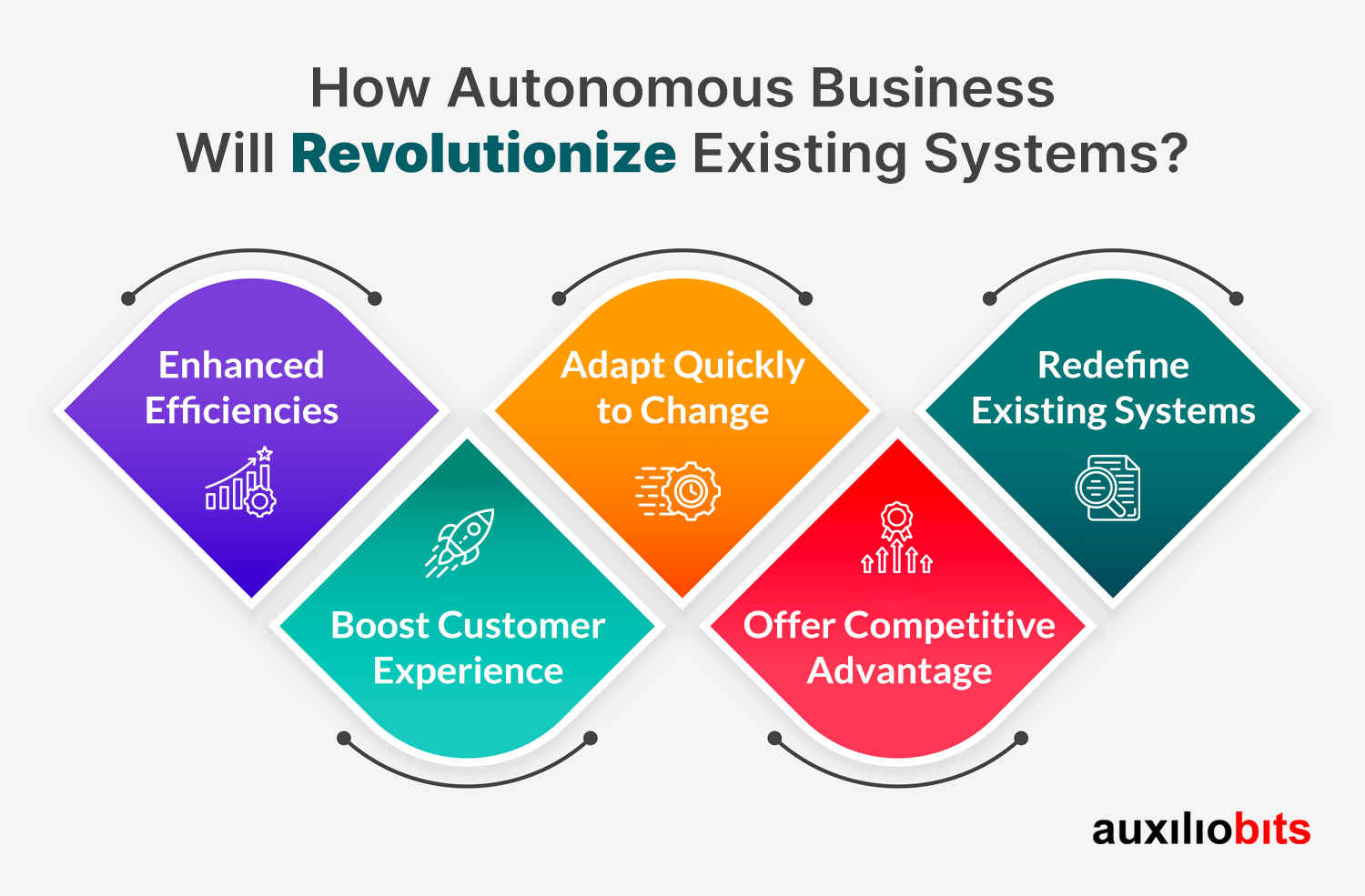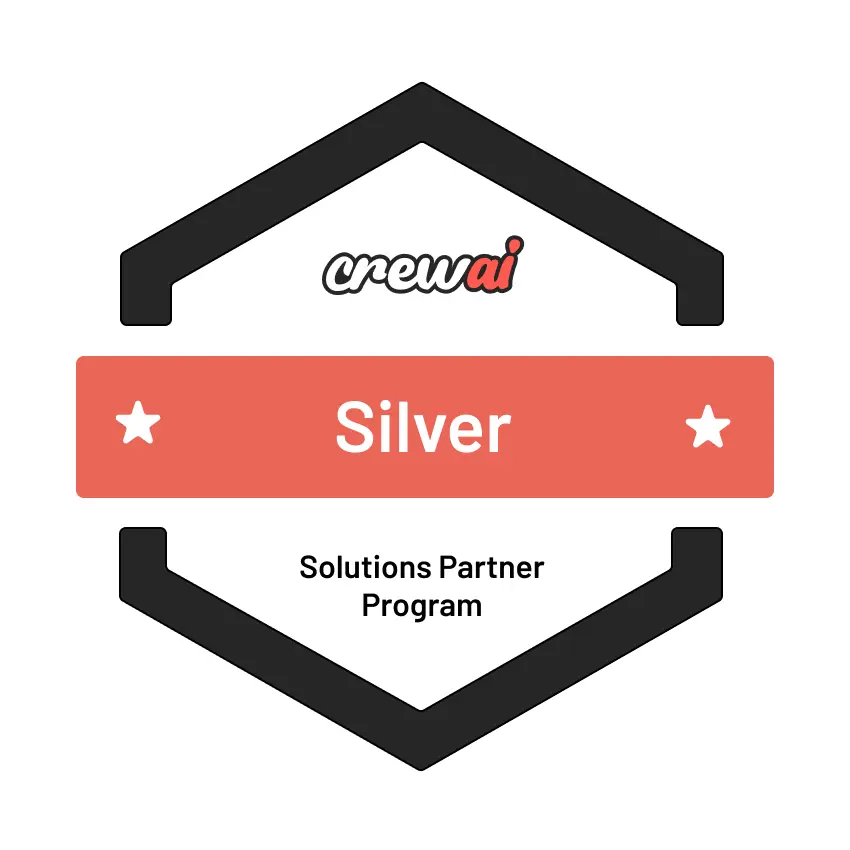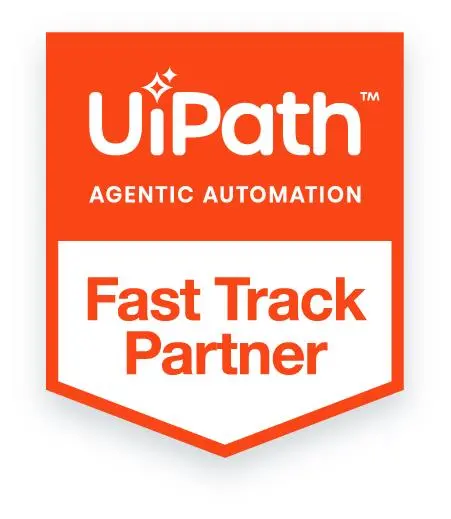
Key takeways
- Autonomous businesses have the potential to drive sustainable growth and offer a competitive edge. They are poised to revolutionize the manner in which businesses strategize, operate, and compete.
- An autonomous business model enhances customer experience, boosts efficiencies, redefines existing systems, and makes the business agile.
- An autonomous business requires investment in various technologies like AI, Gen AI, IoT, etc. You will need the right blend of technologies to make your enterprise autonomous.
- Technologies like AI, Gen AI, etc., are tools, not solutions. All these technologies rely on training data. Hence, humans cannot be eliminated in an autonomous enterprise.
- Transforming your enterprise to an autonomous business requires a systematic approach. You will need to select the best technologies and deploy them according to the specific needs of your business. Working with an automation partner makes this change seamless.
What is the next step after digital transformation?
It is an Autonomous Business!
What is an Autonomous Business?
Gartner defines autonomous business as a business style in which self-learning software bots provide intelligent products and services to the machine-customer-prevalent markets that operate in a programmable economy. (Source: Gartner).
An autonomous business can be envisioned as a self-driving business that has implemented AI, governance, and automation to streamline operations and management. Autonomous businesses can configure, monitor, and maintain themselves with minimal or no human intervention. They can make decisions and take actions on their own. In an autonomous enterprise, AI will supervise and orchestrate other AIs to do the jobs, provide results, and then follow workflows.
Autonomous businesses have the potential to drive sustainable growth and offer a competitive edge. They are poised to revolutionize the manner in which businesses strategize, operate, and compete.
As businesses adopt technologies like RPA and AI to automate rule-based tasks and leverage AI-powered insights for better business outcomes, the emergence of autonomous business was inevitable!
How Autonomous Business Will Revolutionize Existing Systems?
Enhanced Efficiencies
In an autonomous business, automations are integrated across departments and lines of business. For instance, Artificial Intelligence (AI) based bots can analyze data from multiple teams, departments, or lines of business to identify issues in the product, operations, or supply chain. Further, the bots can determine the effective ways of updating operations and they automatically alert multiple teams regarding workflow adjustments across the enterprise. The ability to automate and orchestrate processes across the enterprise enhances efficiencies.

Boost Customer Experience
AI analyzes customer data from multiple sources across the enterprise to offer more comprehensive data about customers. This helps businesses offer products and services tailored to the needs of their customers. Automation also boosts the speed and accuracy of multiple processes across supply and service workflows leading to faster and more accurate responses to customer orders. All these aspects boost customer experience.
Adapt Quickly to Change
Autonomous businesses adapt faster to changes in their environment. This is because AI-powered bots analyze market trends, identify new opportunities, and quickly switch their operational and other strategies according to the changes.
Offer Competitive Advantage
Autonomous businesses leverage emerging technologies to optimize workforces and operations which helps them lower their overhead costs. They can pass on this benefit to their customers by offering their products/services at a lower price to them. This gives them a competitive edge over their peers.
Redefine Existing Systems
Automation of routine processes relieves humans of skilled jobs that are augmented by AI. Hence, businesses need to develop new models that are flexible, agile, and resilient to changing workforce dynamics and market conditions.
In a nutshell, an autonomous enterprise propels your business forward at unprecedented levels of speed, agility, and alignment. The right types of technologies and automation can operationalize agility on a phenomenal scale.
Top Technologies Driving Autonomous Business
Big Data Analytics
Big data refers to the large volumes of datasets available. Harnessing data to extract valuable insights is big data analytics. All technologies like AI, ML, Gen AI, etc., need data to function. Hence we can say that Big data is the core of autonomous businesses.
Internet of Things (IoT)
Data needs to be extracted from multiple sources and provided to AI algorithms. The IoT technology facilitates seamless communication between diverse devices and objects. IoT can gather extensive, real-time data from multiple points and provide it to AI algorithms for analysis. Analysis of real-time data helps businesses take timely action for better outcomes.
Robotic Process Automation (RPA)
RPA is a technology in which bots mimic humans and take over repetitive tasks. RPA bots work with structured data and can take over rule-based tasks. The early RPA bots could automate the simplest of human tasks. However, in recent years, RPA vendors like UiPath have enhanced the capabilities of the bot by integrating techniques like OCR (Optical Character Recognition), NLP, etc.
We can say that RPA bots are the first rung of the ladder for developing an autonomous business model. By automating all the routine tasks across the enterprise, a business saves time, resources, and effort. The processes become more accurate and provide better outcomes.
Cloud Computing
As digital workloads move to the cloud, we are all witness to the manner in which cloud computing has transformed conventional computing methods. The cloud fuels the development of disruptive technologies like AI, IoT, blockchain, and more. This is because the cloud infrastructure facilitates the use of software integrations to create a digital ecosystem that runs seamlessly. Cloud computing centralizes all your business data and paves the way for enterprise-level automation instead of automation of a few processes.
Hyperautomation
Hyperautomation merges RPA (Robotic Process Automation) and AI technologies to strike the right balance between manual effort replacement and automation by optimizing difficult stages. Hyperautomation offers true digital agility and scale flexibility. Hyperautomation enables enterprises to transcend beyond the limits of specific processes to any arduous scalable operation.
Artificial Intelligence (AI)
In an autonomous enterprise, AI is deployed to automate the entire value chain. Either AI makes decisions on its own or it is deployed by employees at all levels to make decisions. AI technology components alongside AI-generated insights can accelerate business outcomes. AI can be embedded into every IT process to drive speed and efficiency.
Machine Learning
Machine Learning (ML) is a subset of AI. While AI gathers and analyzes data to provide insights to decision-makers, ML is a self-learning technology that makes predictions. ML algorithms are trained using the existing datasets. The ML algorithms learn from the data sets and make forecasts. This is an important cog in the wheel of autonomous business as it can help optimize business processes and decisions.
AI and ML models tap into the wealth of data being generated and process it to enable a business to stay ahead of the curve. ML models replicate human cognitive abilities paving the way for autonomous front-end and back-end operations.
Deep Learning
Deep Learning (DL) is a subset of Machine Learning that strives to emulate human neural networks. DL algorithms do not require pre-processed data. They can gather, process, and interpret large volumes of unstructured data and learn without human intervention.
Some practical applications of DL are:
- Natural Language Processing (NLP): Computer software can understand, interpret, and generate text. This allows Large Language Models (LLMs) to perform tasks like text analysis, sentiment analysis, language translation, and speech recognition.
- Computer Vision: Algorithms can identify and process visual content like images or videos, etc., and create a relevant output.
NLP, computer vision and other deep learning technologies power bots with cognitive abilities that can comprehend and respond to text, visual content, etc., just like a human would. Hence, DL models can take over such tasks from humans and create systems that function autonomously.
Generative AI
It is the top technology driving the creation of autonomous, self-sustaining, digital enterprises that can function with minimal human intervention. Gen AI tools, also referred to as Large Language Models (LLMs), use deep learning and large datasets to respond to users and generate content according to their needs.
Generative AI along with low-code platforms makes a business agile because a business can respond more quickly to customer needs, markets, or any other changes. Gen AI tools analyze large volumes of data from multiple sources and provide recommendations in quick time. This helps businesses take proactive steps instead of being reactive.
Gen AI not only streamlines existing processes but also opens the doors to innovative business models and taps into unexplored revenue streams.
Autonomous businesses are not a far-off reality. They are making their presence felt in different areas even as we speak.
Some examples of autonomous enterprises are:
- Tesla
These autonomous vehicles include IoT sensors, cameras, etc., to detect and respond to changes in road conditions while they drive without a human.
- Zara
Leverages AI to optimize supply chain management
- Amazon
Leverages AI and ML to enhance delivery processes.
How to make your Business Autonomous?
- Determine if your Business is Ready
Assess the strengths and weaknesses of your business and its digital maturity.
- Establish Goals
Define automation goals that are aligned with your business objectives.
- Develop an Automation Roadmap
Develop a roadmap that outlines the steps you need to take to achieve your goals. You can break down the entire process into small steps with specific timeframes, milestones, metrics, etc.
- Choose the Best Technologies
You will need the right combination of digital technologies to build an autonomous enterprise. It is beneficial to work with automation partners like Auxiliobits Technologies.
- Ongoing Process
Building an autonomous business is an ongoing process. You will need to continuously track your progress, measure success, and make adjustments as and when required.
When transitioning to an autonomous enterprise, you must bear in mind that you need to develop a culture of innovation. This implies that you must be prepared to experiment, learn from mistakes, and embrace innovation.
Can an Autonomous Business Work Without Humans?
Technologies like AI, Gen AI, etc., are tools, not solutions. All these technologies rely on training data. Hence, humans cannot be eliminated in an autonomous enterprise.
Human intelligence and judgment are required to use tools and technologies effectively. Humans are needed to train AI algorithms and supervise their functioning. Human creativity is required in areas such as development of new products, business strategies, etc. Therefore, automation fuels innovation by freeing humans from routine tasks to focus on creative aspects and other areas that require human Intelligence.
Final Takeaway
Autonomous businesses address some of the biggest business challenges like digital disruption, cost efficiency, customer experience, innovation, scalability for rapid growth, etc. They can help business owners to transcend from being reactive entities to proactive business leaders. These abilities will provide the business a competitive edge when digital disruption accelerates, competition becomes more fierce, and sustainable growth becomes difficult to achieve.
Autonomous Business is the next big change that is going to transform the way businesses function. Transforming your enterprise to an autonomous business requires a systematic approach. You will need to select the best technologies and deploy them according to the specific needs of your business. Working with an automation partner makes this change seamless.
How Auxiliobits can Help?
Auxiliobits is a leading technology provider and consultant. Our professionals work with clients to understand their existing business models and identify the areas for automation to build a fully automated enterprise. We support our clients throughout their transformation journey and beyond to ensure that they enjoy the benefits of an autonomous business. Our in-depth knowledge and experience in working with trending technologies enable us to provide customized automation solutions to our clients.








